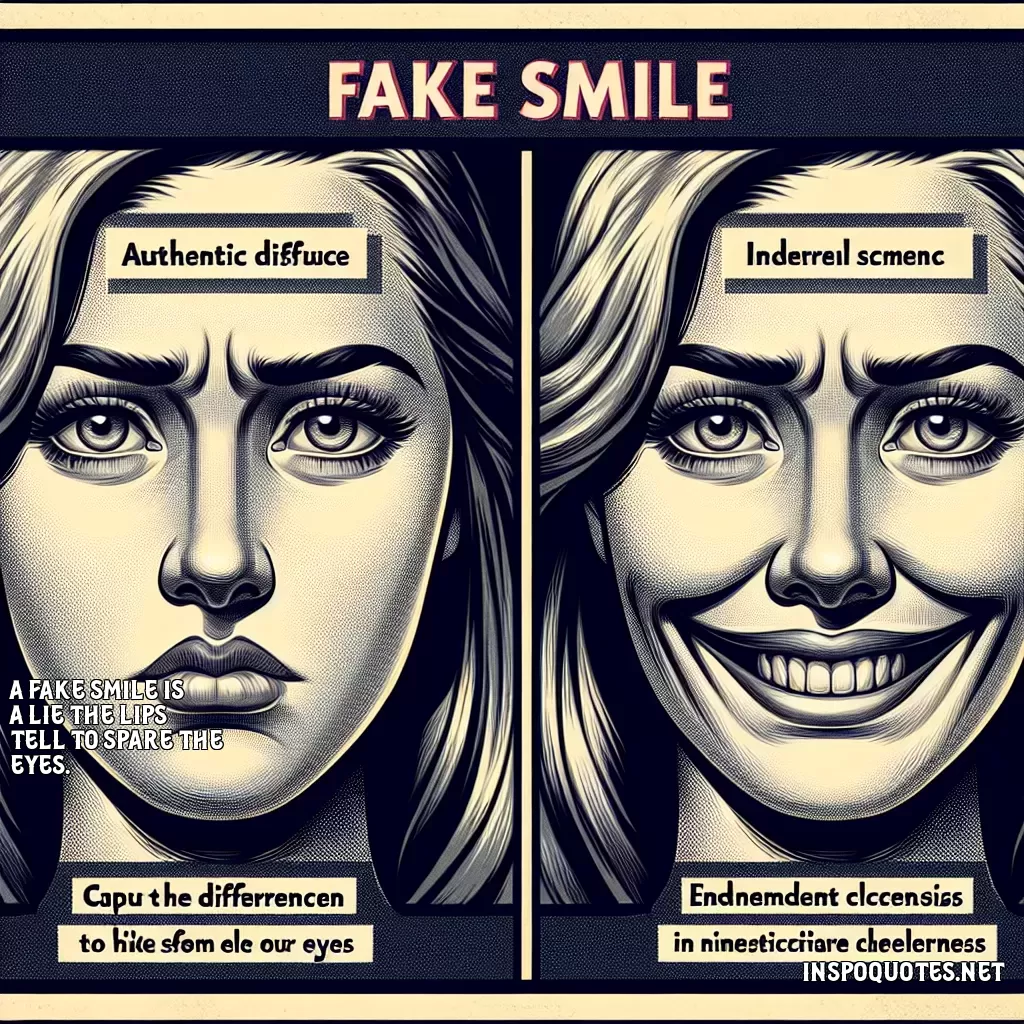
A fake smile is a lie the lips tell to spare the eyes.
Author: Robert Brault
👁️ 13 views
The quote "A fake smile is a lie the lips tell to spare the eyes" explores the complex interplay between emotional expression and perception, focusing on the difference between genuine and superficial emotions. A smile, often considered a sign of happiness, warmth, or friendliness, can sometimes be used as a facade to mask true feelings. This quote suggests that a fake smile is a form of deceit, where the lips are the instruments of this deception. By doing so, the person smiling is attempting to protect or shield the eyes—the proverbial windows to the soul—from revealing their true emotions. This act of concealing true feelings through a smile can serve various social purposes. It might be used to maintain harmony, avoid conflict, or protect oneself or others from discomfort. In many social interactions, people may feel pressure to present themselves positively, even when feeling sad, angry, or anxious. A fake smile in such situations acts as a social lubricant, easing interactions and making them more palatable to others. The phrase "to spare the eyes" symbolizes the intention to avoid deeper scrutiny of one's true feelings. When someone looks into another person's eyes, they can often detect genuine emotion, as eyes tend to reveal truths that a person may wish to hide. By presenting a smile, the lips create a barrier that diverts attention from the eyes, making it less likely for observers to notice any incongruence between the person's outward expression and inward feelings. Thus, this quote encapsulates the dual role of a smile as both a tool for social adherence and a mask for internal discord, illustrating how people often navigate complex emotional landscapes with subtle, yet significant, non-verbal cues. It raises important questions about authenticity and the ways people manage their emotional expressions in everyday life.
Quote By: Robert Brault
Robert Brault is an esteemed American author and essayist, widely recognized for his insightful observations on life and the human condition. Born on March 30, 1938, Brault developed a love for writing early in his life. His passion for literature and ability to capture the nuances of everyday experiences have made his work resonate with readers across generations. Brault's writing journey began in earnest during his formative years, as he honed his craft and explored various themes such as love, loss, and the beauty of life’s fleeting moments.
Throughout his career, Robert Brault has contributed significantly to the literary world with his aphorisms and essays. His writing is characterized by brevity and wisdom, often encapsulating profound truths in concise and memorable ways. Many of Brault’s quotes have become popular, shared widely on social media platforms, where they inspire and uplift diverse audiences. Brault has a unique ability to encapsulate complex emotions in simple language, making his work accessible and relatable.
In addition to his notable quotes and essays, Robert Brault has authored several books, each reflecting his contemplative outlook on life. His literary contributions extend beyond traditional publications, as he frequently shares his insights and musings on his personal website and various online platforms. Brault’s work encourages readers to appreciate the little things in life, reminding them of the importance of gratitude and mindfulness.
Robert Brault’s influence can be seen not only in the literary world but also in the lives of those who encounter his work. His ability to connect with people through his words is a testament to his understanding of the human experience. As Brault continues to write and inspire, his legacy as a thoughtful observer of life endures, making his contributions to literature timeless and impactful. His work remains a beacon for those seeking wisdom and encouragement in an ever-changing world.